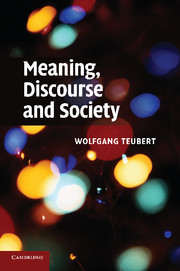Book contents
- Frontmatter
- Contents
- Acknowledgements
- Introduction
- Part I Meaning, the mind and the brain
- 1 The cognitive turn
- 2 The long history of mind linguistics
- 3 What do we know about mental concepts?
- 4 Morphing theoretical sémes into ‘real’ concepts
- 5 From mental representations to conceptual ontologies
- 6 What is meaning?
- 7 Where should we look for meaning?
- Part II Discourse and society
- Conclusion
- Bibliography
- Index
5 - From mental representations to conceptual ontologies
Published online by Cambridge University Press: 04 August 2010
- Frontmatter
- Contents
- Acknowledgements
- Introduction
- Part I Meaning, the mind and the brain
- 1 The cognitive turn
- 2 The long history of mind linguistics
- 3 What do we know about mental concepts?
- 4 Morphing theoretical sémes into ‘real’ concepts
- 5 From mental representations to conceptual ontologies
- 6 What is meaning?
- 7 Where should we look for meaning?
- Part II Discourse and society
- Conclusion
- Bibliography
- Index
Summary
Natural languages leave a lot to be desired. They are, as we have learned, full of vagueness and ambiguity. They are subject to constant change, and under closer scrutiny seemingly regular features tend to get lost in an almost infinite diversity of regional, situational, social, genre-specific and domain-specific variation. We are always encountering language usages which appear foreign to us. For thousands of years people have been complaining about the decay of language. Often when we question language use (normally the way other people use language) we look into the past. Then we ask ourselves what the word in question ‘really’ means, and for really we could read originally. Apparently we long for a Golden Age when there was still a natural, uncorrupted relationship between the word and what it stood for in the world outside. This explains the popularity of etymological dictionaries. But no matter how far we go back, we never seem to arrive at the ‘true’ meaning. Like everyone else, Plato, in his dialogue Cratylus, could not answer convincingly when asked what makes such a relationship natural. To Socrates' question ‘For the gods must clearly be supposed to call things by their right and natural names, do you not think so?’ Hermogenes responds: ‘Why, of course they call them rightly, if they call them at all’ (Plato, translated by B. Jowett on Project Gutenberg online). In which language do the Olympians converse among themselves?
- Type
- Chapter
- Information
- Meaning, Discourse and Society , pp. 67 - 72Publisher: Cambridge University PressPrint publication year: 2010

